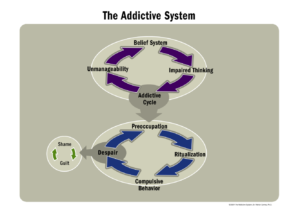It was always the same. I promised myself this was the last time. Never again would I put me in this position. But here I was. I was risking everything, my marriage, my family, my career. I knew that if anyone found out about my behavior, it was all over, but I did it anyway. I just did the same thing over and over again. I could not understand why I could not change. Willpower had failed me.
JD, Sex addict now in recovery
When sex addicts come in for therapy, I often hear some version of JD’s story. The situation is different, but the core of the story is the same. JD is trapped in his sex addiction. What he may not understand is that his sexual obsession is rooted in an addictive cycle embedded in a more substantial addictive system. This addictive system is built on some core, often unconscious, beliefs held onto by a sex addict. This belief system creates a more significant addictive order that power the addictive cycle. For most sex addicts they can see the addictive cycle clearly, but the underlying addictive system can often elude them until they get sobriety and engage in therapy.
First, let’s quickly break down at the cycle of sex addiction so we can then look at the underlying core beliefs of the sex addict. Breaking down the cycle will help us understand the more significant addictive system.
The four stages of the cycle are:
- Preoccupation
- Ritualization
- Acting Out
- Shame and Despair
If you would like to read more about the addictive cycle than clicking the link below will take you to this blog post.
Blog Post – Knowing The Sex Addiction Cycle
The addictive cycle is rooted in a broader addictive system. Outlining the four stages of the addictive cycle help us to identify the problematic sexual behavior, but it does not look at the underlying beliefs that keep this addictive cycle going.
Now, the addictive system is built on some core beliefs that addict either consciously or unconsciously holds. These assumptions provide the power to the addictive cycle. At first, for most sex addicts, they can’t always see this system as it has become buried in the sexual acting out and the consistent nurturing of sexual arousal for escape and avoidance of the very feelings these beliefs create. The sex addiction cycle is apparent, but the addictive system is sometimes elusive for the addict to see without the help of a sex addiction therapist.
It is essential to understand that our belief system is a collection of stories, myths, and convictions we tell ourselves about the world. It forms the premise of our reality. Our beliefs drive our decisions.
Our beliefs control our internal dialogue. We say things to ourselves like, “no one can be trusted” or “everyone is in it for themselves.” We can also have these about sex as well, such as “men only want sex,” “sex is dangerous” or “women will always cheat.” These beliefs impact how we make decisions in our life. At the center of all these views are the beliefs we hold about ourselves.
In the book “Facing The Shadow,” Patrick Carnes, identifies four core beliefs of the sex addict.
- I am basically a bad, unworthy person.
- No one would love me as I am.
- My needs are never going to be met if I have to depend on others.
- Sex is my most important need.
Patrick Carnes outlines this inter logic eloquently in his book “Facing The Shadow, Starting Sexual and Relationship Recovery,”
There is an internal logic that goes like this: because I am unworthy, no one would love me if they really knew what I was like on the inside. Consequently, my needs are never going to be met if I have to tell the truth about who I am. Given that sex is my most important need, I will never be able to depend on another person who really knows me to get it.
This diagram, created by Patrick Carnes outlines this larger addictive system and how it drives the addictive cycle.
These are the deep underlying core beliefs of a sex addict. The belief system feeds the sex addiction cycle. It is not until these deep beliefs are resolved that a sexual addict can have a full recovery. Having these unresolved beliefs is why individual therapy and group sex addiction therapy are so crucial to the addict looking for sex addiction recovery. They need to learn that they are lovable and this comes out of the sincere, honest and long-term relationships formed in the recovery process with therapists, 12-step sponsors, and recovery peers. There is no easy way around it. These relationships need to be built.
This process takes time. There is not a quick fix. If we knew it, we would be more than happy to share it. You can’t think your way out of this. Recovery is an emotional journey with yourself and others.
If you or your partner are struggling with sexual addiction, we can help. Novus Family Counseling and Recovery Center provides individualized sex addiction treatment to people that want help. Give us a call today.
Blog Post Photo by Warren Wong on Unsplash

